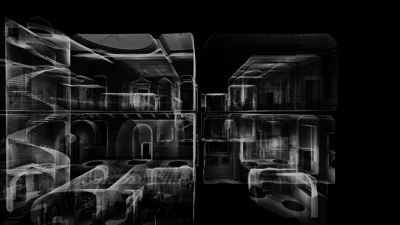Articulating peripheral space: new perspectives in digital heritage
Kennedy, Stephen and Withers, Simon  ORCID: 0000-0002-0203-359X
(2023)
Articulating peripheral space: new perspectives in digital heritage.
In: Heritages Past and Present. Built and Social: A Conference on Culture, History, Art and Design, 28th - 30th June 2023, Czech Technical University, Prague.
(Unpublished)
ORCID: 0000-0002-0203-359X
(2023)
Articulating peripheral space: new perspectives in digital heritage.
In: Heritages Past and Present. Built and Social: A Conference on Culture, History, Art and Design, 28th - 30th June 2023, Czech Technical University, Prague.
(Unpublished)
![[img]](/43412/1.hassmallThumbnailVersion/IMG_2036.jpeg)
|
Image (JPEG) (Captivate Spatial Modelling - Queen’s House - Internal organs)
IMG_2036.jpeg - Accepted Version Download (681kB) | Preview |
Abstract
New modes of engagement with specific sites of historical interest can bring much needed knowledge and understanding of our contemporary plight. Reflecting dominant thinking from the period of their construction, such sites - that have long appeared to be frozen in time, permanent structures of cultural significance and monuments to order and a time when everything stood still - can now reveal new insights. Captivate use a range of digital mapping technologies to investigate the object as data set, where sound and the diffuse temporality of noise are incorporated This approach serves to challenge a mode of sensory engagement with the world that has been conditioned by centuries of normative practices, resulting in a particular form of ocularcentrism. Such practices are historically contingent, and in some ways, arbitrary (though often imposed for good reason). They have plotted an anthropocentric course that is now rightly being questioned. Old certainties no longer endure, and we face a choice: to remain static and perish along with our planet and its moribund political and economic structures or embrace uncertainty and the constancy of change; experiencing the world anew, using combinations of sensory perception enabled by new technology and informed by critical thinking. We must set in train immediately further research into different modes of experiencing, to challenge previously received logic and knowledge and to embrace the challenges of the future. Images/representations/datasets can make manifest some complex aspects of research – modes of experiencing, perception/conception, ontological status, dimensionality and digital aesthetics and discursive regimes. These in turn have very significant political and economic repercussions. Who gets to speak and about what, and how can new channels of communication support enhanced participation? How can we alleviate collective anxiety in the face of global crises?
| Item Type: | Conference or Conference Paper (Paper) |
|---|---|
| Uncontrolled Keywords: | Captivate; Maritime Greenwich; sound; noise; LiDAR; 3D scan |
| Subjects: | N Fine Arts > N Visual arts (General) For photography, see TR N Fine Arts > NA Architecture T Technology > T Technology (General) |
| Faculty / School / Research Centre / Research Group: | Faculty of Liberal Arts & Sciences Faculty of Liberal Arts & Sciences > Captivate: Spatial Modelling Research Group |
| Related URLs: | |
| Last Modified: | 07 Sep 2023 15:22 |
| URI: | http://gala.gre.ac.uk/id/eprint/43412 |
Actions (login required)
 |
View Item |
Downloads
Downloads per month over past year
 Tools
Tools Tools
Tools
